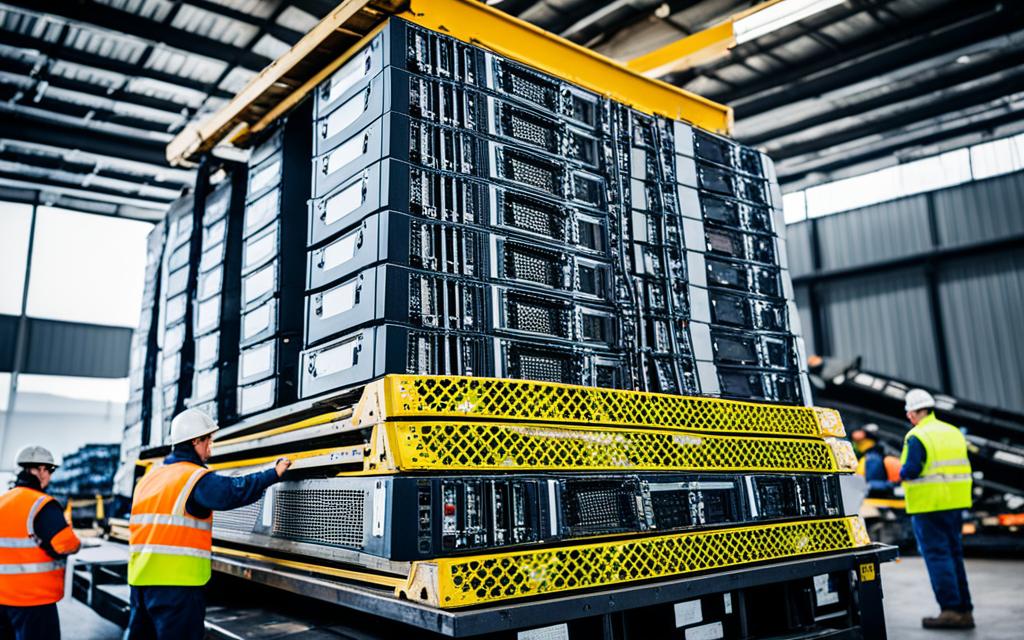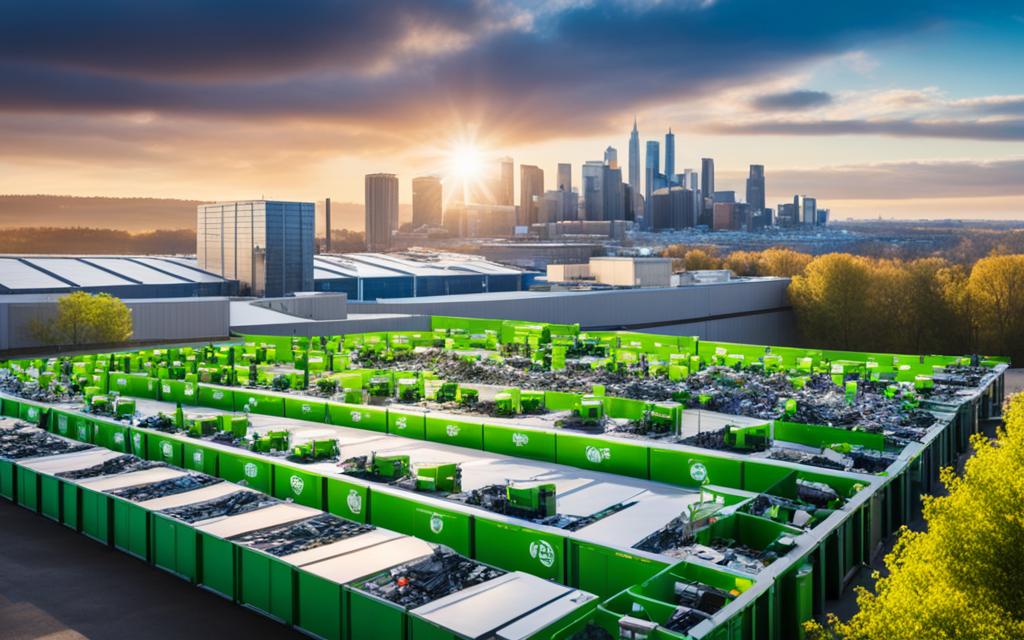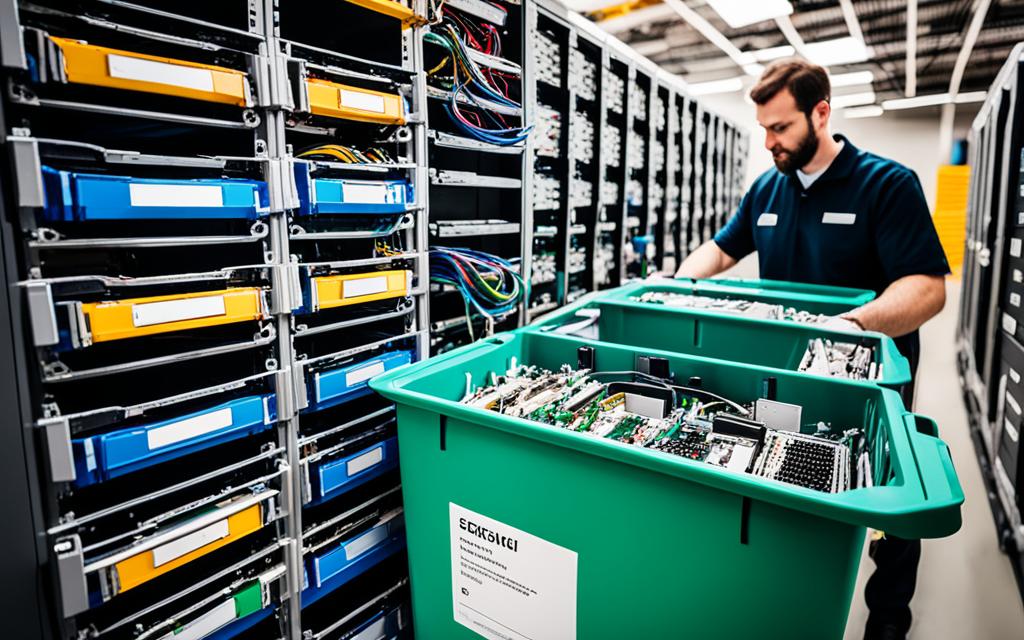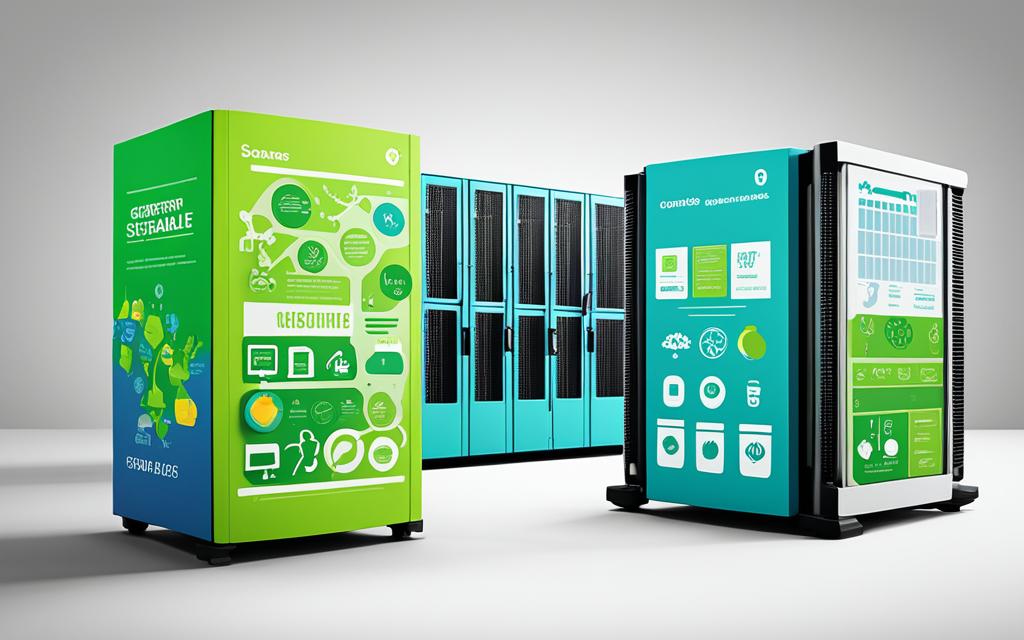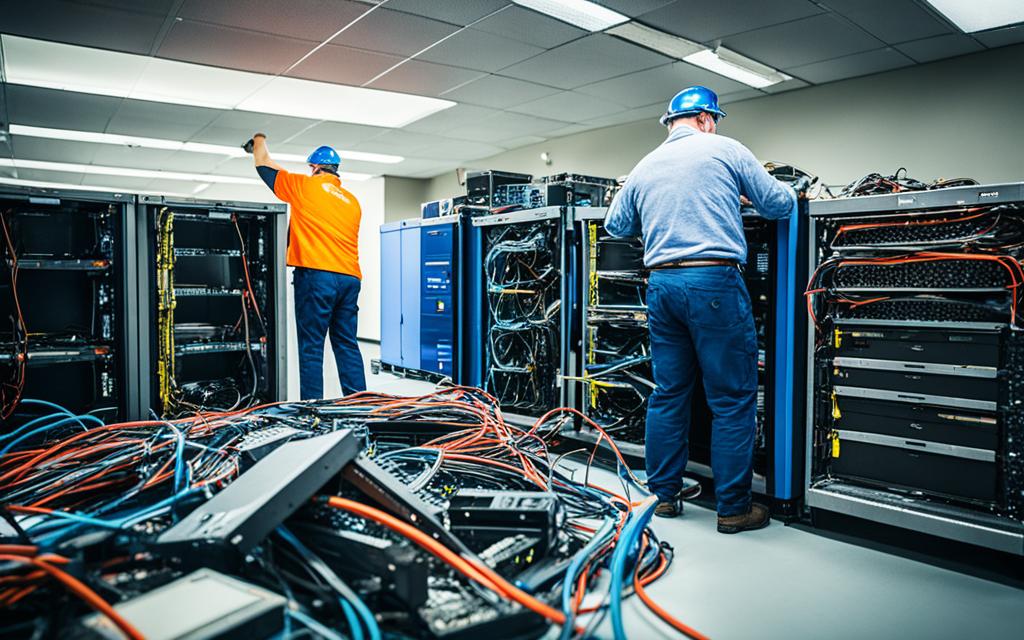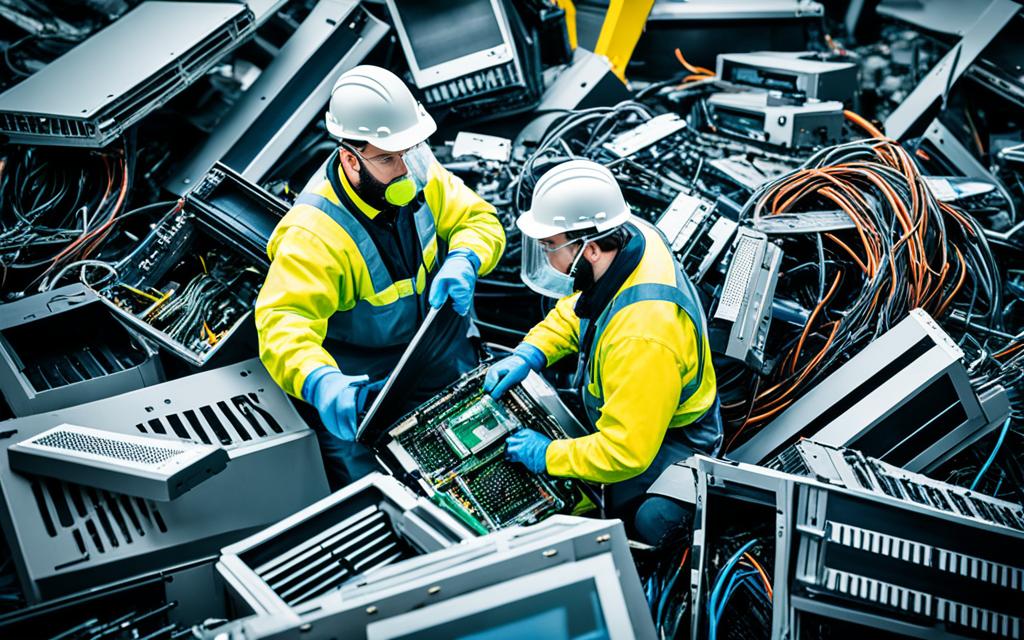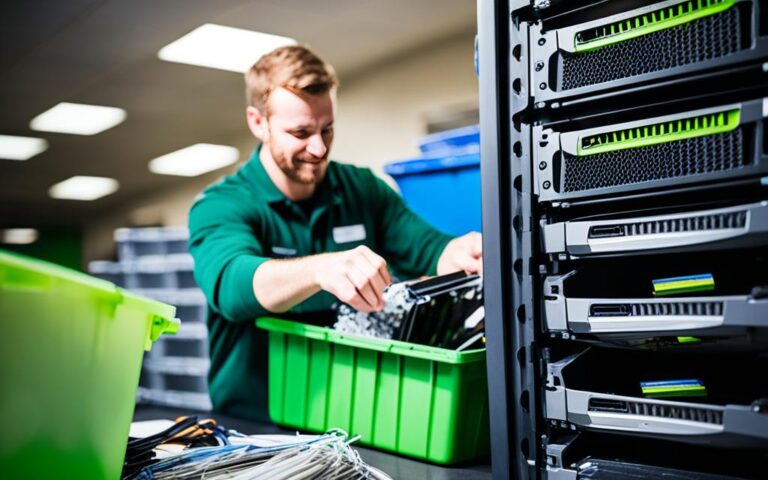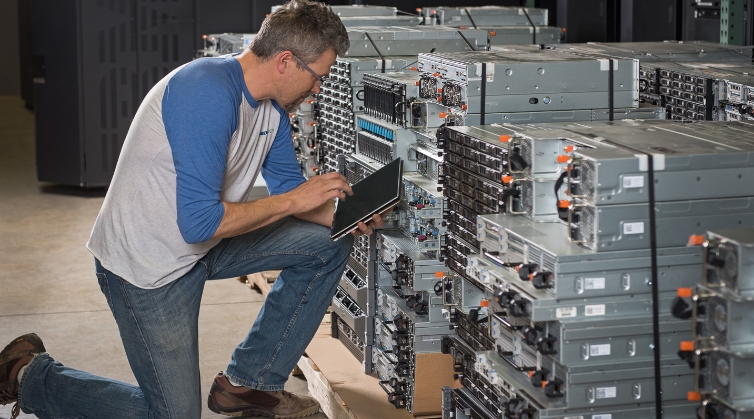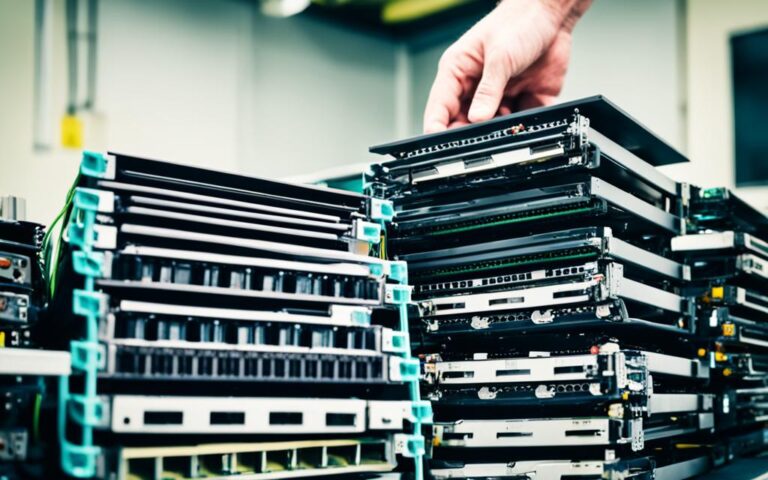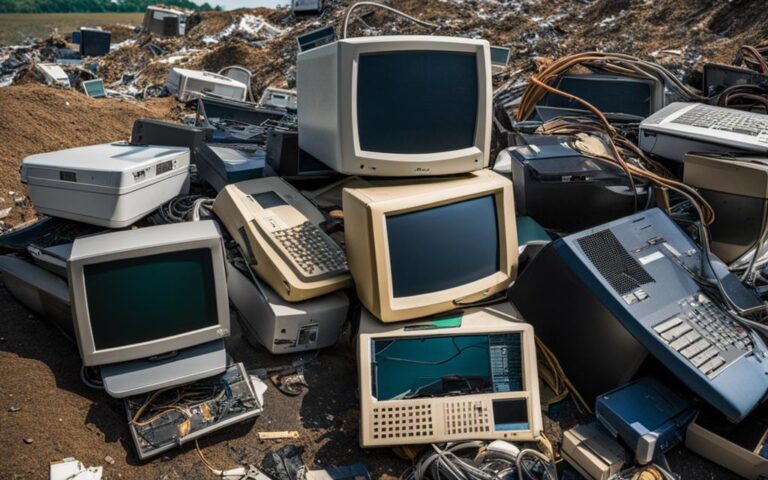Server Recycling: How to Overcome Logistical Challenges
Server recycling is crucial for businesses looking to reduce their environmental impact and optimize IT investments. However, it can present logistical challenges that need to be addressed. Overcoming these challenges is essential to ensure a smooth and efficient server recycling process.
Proper server recycling involves a comprehensive understanding of the logistics involved. This includes data backup and wiping, choosing the right disposal method, and working with certified recycling facilities.
By following best practices and partnering with a reputable server recycling provider, businesses can overcome these logistical challenges effectively. They can ensure data security, comply with regulations, and contribute to a more sustainable future.
Understanding the Importance of Server Recycling
Server recycling plays a vital role in today’s business landscape. It is not only about responsible server disposal but also about the significant environmental impact it can have. Proper disposal of servers is crucial for preventing data breaches and avoiding heavy fines. Furthermore, it ensures that toxic components, including hazardous heavy metals, do not end up in landfills, protecting both the environment and human health.
One of the key benefits of server recycling is its positive effect on resource conservation. By reusing valuable materials found in servers, businesses can reduce the demand for raw resources. This conserves natural resources and minimizes the negative environmental impact of electronic waste. With the rapidly increasing volume of e-waste, server recycling is an effective strategy for creating a more sustainable future.
“Server recycling helps businesses protect their data, comply with regulations, and contribute to a more sustainable future.”
By prioritizing responsible server recycling practices, businesses can protect their sensitive data by ensuring it is securely disposed of. This not only safeguards their intellectual property and confidential information but also helps maintain compliance with data protection regulations.
“Server recycling reduces the risk of data breaches and fines, protects the environment, and contributes to a greener future.”
In conclusion, server recycling is of utmost importance due to its numerous benefits. It helps businesses protect their data, comply with regulations, and minimize the negative environmental impact of end-of-life servers. By embracing responsible server disposal practices and partnering with certified recycling facilities, businesses can make a positive difference in both data security and environmental sustainability.
The Process of Server Recycling
Server recycling involves a meticulous process that ensures data protection, environmental responsibility, and legal compliance. By following a step-by-step guide to server disposal, businesses can effectively manage their server’s end-of-life cycle.
1. Data Backup: The process begins with data backup to preserve important information. This ensures that businesses retain any critical data stored on the server before its disposal.
2. Data Wiping: Once the data backup is complete, data wiping is carried out. This secure process erases all data from the server, preventing any potential breaches in data security. By eliminating any traces of sensitive information, businesses can protect themselves and their stakeholders.
3. Component Breakdown: After data wiping, the server is broken down into its component parts. This breakdown serves two main goals: protecting sensitive data and reducing environmental impact. By safely separating the various components, businesses can ensure the proper disposal of hazardous materials and promote sustainability.
4. Recycling or Reusing Components: Recycling facilities play a vital role in the server recycling process. These facilities responsibly recycle or reuse server components, recovering valuable materials while minimizing environmental harm. Through this process, businesses contribute to the circular economy and reduce their reliance on raw resources.
Following this server recycle process guarantees that businesses prioritize data security, minimize their environmental impact, and comply with relevant regulations.
Common Materials Found in Servers
In the world of server recycling, it’s important to understand the various materials that make up these devices. Servers are composed of a combination of metals, plastics, and hazardous materials. By recycling these materials, businesses can contribute to reducing the need for mining, conserving resources, and protecting the environment.
Metals
Common metals found in servers include aluminum, copper, and precious metals like gold and silver. These metals are valuable resources that can be extracted and reused through recycling. By recovering these metals from old servers, we can minimize the environmental impact of mining and reduce the demand for raw materials.
Plastics
Server casings and internal components are often made of plastics. Recycling these plastics has significant benefits, including conserving non-renewable resources and reducing greenhouse gas emissions. Properly recycling server plastics ensures that they are repurposed instead of ending up in landfills.
Hazardous Materials
Servers also contain hazardous materials such as lead, mercury, and cadmium. Improper disposal of these materials can pose serious health and environmental risks. That’s why it’s crucial to handle them responsibly during the recycling process. Certified recycling facilities have the expertise to safely extract and dispose of these hazardous materials, ensuring they do not harm the environment or human health.
Recycling servers not only helps businesses optimize their IT investments but also enhances their environmental stewardship. By properly recycling the materials found in servers, we can reduce the need for mining, conserve resources, and protect the environment for future generations.
By understanding the composition of servers and the importance of recycling their materials, businesses can make informed decisions when it comes to server disposal. The next section will focus on the best practices for server recycling, including data security, compliance, and cost optimization.
Best Practices for Server Recycling
When it comes to server recycling, implementing best practices is crucial for businesses seeking efficient and environmentally responsible solutions. By following these guidelines, businesses can ensure data security, compliance with regulations, and optimize costs.
Develop a Comprehensive ITAD Policy
Creating a comprehensive IT Asset Disposition (ITAD) policy sets a clear framework for the responsible disposal of servers. This policy should outline the procedures, guidelines, and regulations that govern the entire server recycling process. By establishing a robust ITAD policy, businesses can ensure consistency and accountability in their recycling practices.
Maintain an Accurate Inventory of IT Assets
Having an accurate inventory of IT assets is essential for effective server recycling. This includes identifying and documenting all servers within the organization, including their specifications and usage history. An updated inventory helps businesses track the lifecycle of their servers and make informed decisions regarding recycling or refurbishment.
Choose a Reputable Recycling Partner
Collaborating with a reputable recycling partner is paramount to successful server recycling. Look for certified recycling facilities that adhere to industry standards and environmental regulations. Make sure the recycling partner is equipped to handle data destruction and responsible disposal. Choose a partner that prioritizes environmental sustainability and provides transparent reporting on the recycling process.
Data Security: Certified Destruction
Data security should be a top priority when recycling servers. Certified data destruction ensures that sensitive information is completely wiped from the servers before disposal. Utilize expert services that employ data destruction methods complying with industry standards, such as the NIST 800-88 guidelines. This guarantees that all data is irretrievable, minimizing the risk of data breaches and maintaining customer trust.
Compliance with Regulations and Industry Standards
Complying with regulations and industry standards is crucial for server recycling. Regulations such as the General Data Protection Regulation (GDPR) and the Waste Electrical and Electronic Equipment (WEEE) Directive outline specific requirements for server disposal. By ensuring compliance with these regulations, businesses can avoid fines and penalties while promoting responsible recycling practices.
Cost Optimization through Value Recovery
Efficient server recycling can lead to cost optimization. By recovering value from old servers, businesses can offset the costs of recycling while making a positive environmental impact. Components that can be reused or resold can provide a financial return, reducing disposal costs and improving the overall return on investment.
Incorporating these best practices allows businesses to achieve efficient and environmentally responsible server recycling. By prioritizing data security, regulatory compliance, and cost optimization, businesses can make a positive contribution towards a sustainable future.
Benefits of Server Recycling for Your Business
Proper server recycling offers several benefits for businesses. By prioritizing server recycling, companies can make a positive impact on the environment, enhance data security, achieve cost savings, and improve their reputation among stakeholders and customers.
- Environmental Stewardship: Server recycling demonstrates a commitment to reducing the environmental impact of electronic waste. By responsibly disposing of servers, businesses contribute to a more sustainable future and protect the planet.
- Data Security: During the recycling process, sensitive data is securely destroyed, minimizing the risk of data breaches. This ensures that businesses remain compliant with data protection regulations and safeguard their valuable information.
- Cost Savings: Server recycling allows businesses to recover value from old servers. Valuable materials can be reused or recycled, reducing the need for new resource extraction. Additionally, optimizing IT investments through proper disposal can lead to significant cost savings in the long run.
- Improved Reputation: Embracing robust server recycling practices enhances a company’s reputation among various stakeholders such as customers, employees, and investors. Demonstrating a commitment to environmental responsibility and sustainable practices fosters trust and loyalty.
By actively considering the benefits of server recycling, businesses can contribute to a greener future while also enjoying the advantages of enhanced data security, cost savings, and a positive brand image.
Conclusion
Server recycling is an essential aspect of optimized IT asset management, enabling businesses to reduce their environmental impact, ensure data security, and comply with regulations. By following best practices and partnering with reputable recycling providers, businesses can overcome logistical challenges and achieve efficient and environmentally responsible server recycling.
The benefits of server recycling are numerous. Firstly, it allows businesses to save costs by recovering value from old servers and minimizing disposal expenses. Secondly, it enhances data security through certified data destruction, protecting sensitive information from unauthorized access. Additionally, server recycling contributes to a positive reputation for businesses, demonstrating their commitment to environmental stewardship and sustainable practices.
Prioritizing server recycling not only benefits individual businesses but also contributes to a more sustainable future. By recycling servers, businesses play a crucial role in conserving resources, reducing electronic waste, and minimizing the carbon footprint associated with IT equipment. Implementing efficient server recycling practices demonstrates a commitment to environmental responsibility and aligns with the broader goal of achieving a sustainable and greener future.
FAQ
Why is server recycling important?
Server recycling is crucial for businesses to reduce their environmental impact and optimize their IT investments. It also helps prevent data breaches, comply with regulations, and contribute to a more sustainable future.
What are the logistical challenges of server recycling?
Server recycling presents challenges such as data backup and wiping, choosing the right disposal method, and working with certified recycling facilities.
How does server recycling work?
Server recycling involves a process that includes data backup, secure data destruction, component breakdown, and recycling or reusing server components through certified recycling facilities.
What materials are commonly found in servers?
Servers contain various materials, including metals (aluminum, copper, precious metals), plastics, and hazardous materials (lead, mercury, cadmium).
What are the best practices for server recycling?
Best practices for server recycling include developing an ITAD policy, maintaining an accurate inventory of IT assets, choosing a reputable recycling partner, ensuring data security, and complying with regulations and industry standards.
What are the benefits of server recycling for businesses?
Server recycling offers benefits such as environmental stewardship, enhanced data security, regulatory compliance, cost savings through value recovery from old servers, and improved reputation.

